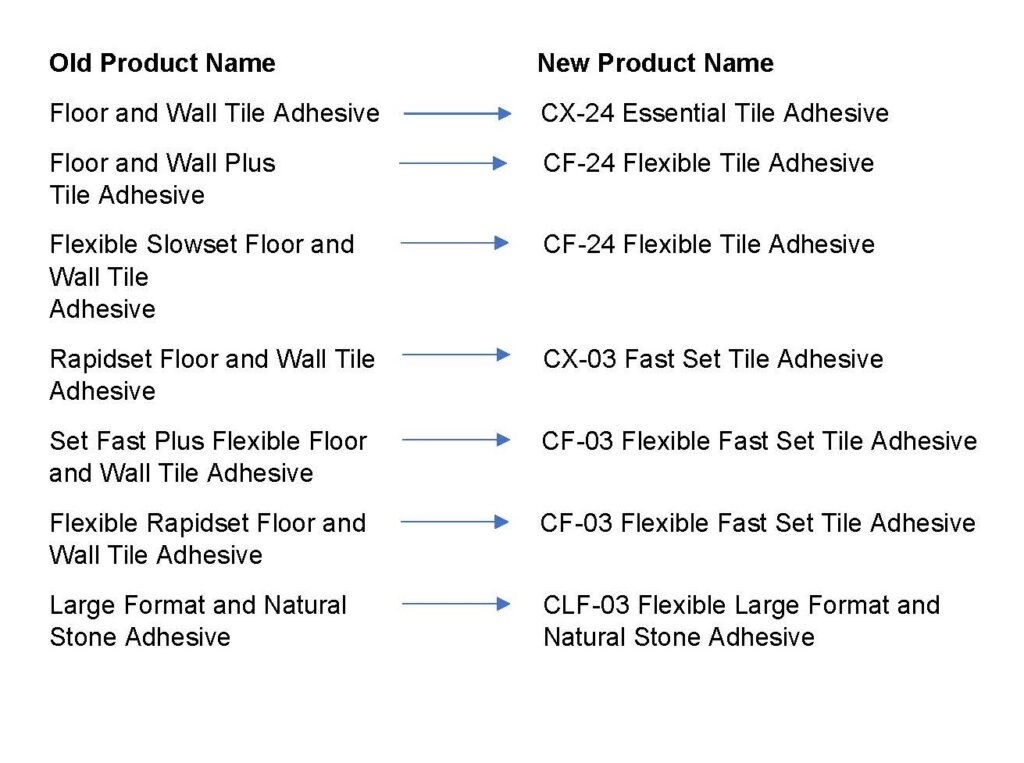AVAILABLE TO ORDER NOW!
Dunlop has launched a new powdered tile adhesive range this summer to make it easier for builders and tradesman to select the right products for their tiling this summer.
Dunlop has refined and refocused its range around the types of adhesives most favoured by builders and tradespeople. Some of the best sellers have also benefited from formulation improvements. In addition, Dunlop are also launching two new “S1” tile adhesives – these have increased deformation, meaning they can be used on substrates where limited movement or vibration is possible .
The packaging and product names are also changing for the range. Products have been renamed using alpha-numeric coding, whilst retaining the longer product name descriptions and colour tones to ensure the products can be easily identified during the transition.
This will make it easier for tradespeople to select the products they love, make ordering easier and provides a summary of the product characteristics at a glance so they can choose the right product for the tiling job at hand.
Products that are changing are:

The alpha-numeric product codes help identify whether the product is non-flexible cement-based (CX), flexible cement-based (CF), or cement-based large format (CLF). The number equates to the setting time of the product; so 24 = 24 hours, 3 = three hours etc.
Items that are removed from Dunlop’s range include: Floor and Wall Plus White 20kg, Rapidset Floor and Wall Tile Adhesive Grey Set Fast Plus Flexible Floor and Wall Tile Adhesive, Tile Adhesive for Green Screed and 2-Part Rapidset Flex Grey 11.55kg.
New Innovations
As well as re-naming current products, Dunlop are also introducing two “S1” tile adhesives.
CS1-12 S1 Ultra Flexible Tile Adhesive and CS1-03 S1 Ultra Flexible Fast Set Tile Adhesive – as the name suggests – are S1 deformable tile adhesives that set in 12 and 3 hours respectively.
Being S1 deformable means the product can be used on projects where a little bit more “give” is required. Areas where an S1 tile adhesive may be beneficial include:
- Heated floors i.e. heated screeds or undertile floor heating (i.e. electric heating mats)
- Floors subjected to limited movement i.e. suspended floors
- External wall and floor tiling
- Areas where vibration from machinery is likely to impact upon wall tiling.
David Rowley, Training Manager at Dunlop, said: “We have streamlined the range to provide tradespeople with the products that are most wanted for their tiling jobs.
“The new product names are easy to understand and we have kept the colour coding so tradespeople can easily decipher the equivalent new product from the old products.”
Slow set or fast set, flexible or non-flexible?
So when should a tradesperson select a slow-set or fast-setting product? When should it be flexible or non-flexible?
Well it all depends on the individual tiling project, the environment, the tile type and the background you are tiling onto.
For example, if you are tiling in particularly hot and dry weather, you would be advised to select a slower setting product such as CX-24 Essential Tile Adhesive or CF-24 Flexible Tile Adhesive. This is because the hotter the temperature, generally the quicker a tile adhesive will “go off”. If you are using a rapid-setting product at elevated temperatures it will skin over more quickly, thus reducing the time in which the tiles can be successfully placed onto the adhesive ribs as well as having a reduced pot life.
And vice-versa, when tiling in cold temperatures (but no lower than 5°C and rising), for example use of a rapid-setting product will allow you to grout more quickly than a standard setting adhesive.
You should also consider the tile type. For example, very porous tiles and natural stone, such as marble or limestone, should be tiled with rapid-setting products. This is because standard setting adhesives may cause some potential staining with some natural stone products.
Tiles can experience a lot of stress due to movement in the substrate, foot-traffic and thermally-induced expansion and contraction that can come from underfloor heating or environments such as conservatories / orangeries. In this instance a flexible tile adhesive – such as CF-03 or CF-24 – should be used as these can accommodate some limited movement and help to reduce the risk of tiles debonding or cracking.
S1 tile adhesives, such as new CS1-12 S1 Ultra Flexible Tile Adhesive and CS1-03 S1 Ultra Flexible Fast Set Tile Adhesive are deformable meaning they provide an additional protection against movement caused by, for example underfloor heating.